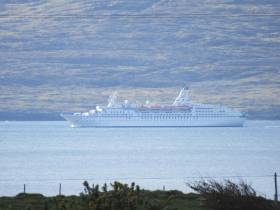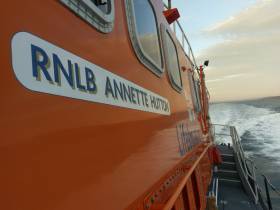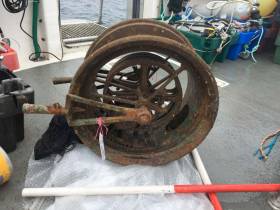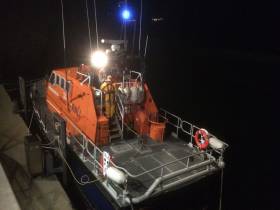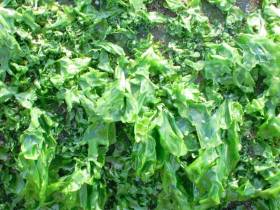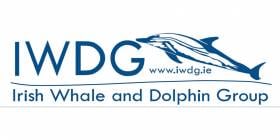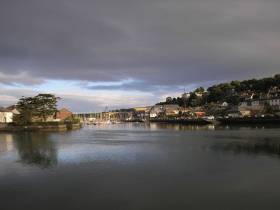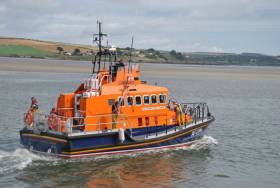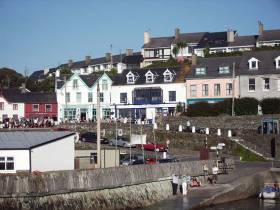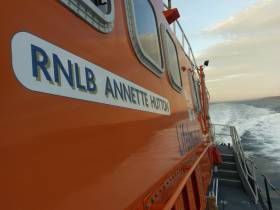Displaying items by tag: west cork
Councillors in west Cork say they fear that Dublin Port’s decision to reduce the number of cruise ships by 50% between 2021 and 2023 could have a negative affect on cruise tourism in West Cork.
The issue writes The Southern Star was raised at a Western Division meeting of Cork County Council by Cllr Declan Hurley (Ind) who said the port’s decision was based on the fact that freight business is proving more profitable for the company.
This year, Cllr Hurley said: ‘Dublin Port is to receive 160 cruise liners, but the number will reduce to 36 large and 18 small liners by the year 2021.’
The councillor said cruise tourism is directly worth €560,000 to the West Cork economy and he suggested that every effort should be made to preserve and promote it.
Cllr Mary Hegarty (FG) said Cllr Hurley’s motion, which called on the Council to protect its investment in cruise tourism, was ‘timely.’
Read here on what the councillor had to say on the issue and more.
Castletownbere’s RNLI lifeboat sprang into action to help locate a tourist reported missing on Dursey Island in West Cork yesterday afternoon (Friday 17 May).
The lifeboat, under the command of coxswain Dean Hegarty, launched shortly after 2pm after Valentia Coast Guard radio received reports that a visitor to the island off the Beara Peninsula had gone missing.
Also tasked were the Shannon-based Irish Coast Guard helicopter Rescue 115, Derrynane Inshore Rescue Boat and the Naval Service vessel LÉ Ciara.
Once on scene, the lifeboat commenced a search of the area while Rescue 115 did a sweep of the island and spotted a person who fitted the description of the casualty.
The coastguard helicopter lowered a winchman and confirmed that the casualty was safe and well. All emergency services were then stood down.
Commenting on the callout, launching authority Paddy O’Connor said: “We are delighted at the very swift response of the crew and that the casualty was located safe and well.”
The US businessman owner of the Lusitania wreck off the West Cork coast has gifted it to a local heritage group planning a new museum around the historic vessel, as the Irish Examiner reports.
Gregg Bemis signed over the wreck to the operators of the Lusitania Museum and Old Head Signal Tower in Kinsale, in the hopes of continued efforts to discover what really happened when it was sunk by a German U-boat 104 years ago yesterday, 7 May.
The multi-millionaire had owned the Lusitania since the 1960s and used his own fortune to fund numerous exploratory dives over the years.
Many of these have been fruitful in recovering artefacts, such as two of the ship’s telegraphs in 2016 and 2017 respectively.
But the 91-year-old businessman believes the question of what caused a mysterious second explosion on the ship when it went down still needs to be solved — contrary to allegations made in a National Geographic documentary in 2012.
Bemis has also been at odds with the State over its strict licensing rules for wreck dives — and the Lusitania’s new owners hope the Government will relax these rules to encourage their own planned research and recovery efforts.
It’s intended that many items recovered from the Lusitania will take pride of place in a ‘living museum’ in the area dedicated to the ocean liner’s remarkable story.
Dungarvan diver Eoin McCarry, a friend of Bemis, said: “It’s like as if the Lusitania is coming home.”
The Irish Examiner has more on the story HERE.
Baltimore Lifeboat In Medical Evacuation From Sherkin Island
#Lifeboats - Baltimore RNLI carried out a medevac on Thursday night (11 April) from Sherkin Island off the coast of West Cork.
The volunteer crew launched their all-weather lifeboat following a request from the Irish Coast Guard at 9.29pm to provide medical assistance and evacuation to an islander living on Sherkin.
Conditions at sea during the callout were calm with good visibility and no sea swell.
The lifeboat arrived at Sherkin pier at 9.45pm, the casualty was brought onboard and the lifeboat departed the island within four minutes, handing the casualty over to the care of HSE ambulance crew at 10.08pm.
Speaking following the callout, Kate Callanan, Baltimore RNLI volunteer lifeboat press officer, said: “Baltimore RNLI regularly provides the vital service of medical evacuations (medevacs) for residents and visitors to local islands such as Sherkin, Cape Clear and Heir.
“If you find yourself in need of medical assistance, call 999 or 112 and ask for the coastguard.”
Elsewhere, volunteer lifeboat crews from the Aran Islands and Galway RNLI participated in a multi-agency training exercise on Galway Bay this week.
The all-weather lifeboat from Aran Islands RNLI and the inshore lifeboat from Galway Bay RNLI were among the many emergency service agencies that took part in a maritime mass rescue exercise.
The scenario training, which saw the lifeboat crew practise an evacuation of survivors from a seagoing ferry in a busy shipping lane, was organised as part of a multi-agency exercise co-ordinated by the Irish Coast Guard.
Among the other agencies involved were the Irish Coast Guard rescue helicopters located at Sligo and Shannon, Doolin/Inisheer Boat Unit, Costello Bay, Killaloe, Kilkee and Cleggan Coast Guard units, Galway Fire Service and the HSE.
Nitrates and phosphates from intensified agriculture are a significant cause of so-called green and red tides in West Cork, according to a new report.
Dr Liam Morrison, one of the researchers behind the NUI Galway study, tells the Southern Star that more must be done to keep farm nutrients from flowing out to coastal areas where they feed the growth of red and green seaweed or sea lettuce blooms.
While these blooms currently pose no heath risk to humans, the report alleges that they cause issues for inshore navigation, sea angling and ultimately tourism.
However, the Irish Farmers’ Association says agriculture cannot be solely to blame — citing a reduction in seaweed blooms in areas where wastewater treatment schemes have been upgraded.
The Southern Star has more on the story HERE.
Whale & Dolphin Strandings In Cork This Week ‘Only A Percentage Of What Is Actually Dead At Sea’
#MarineWildlife - Unusual weather for this time of year may be responsible for a recent spate of whale and dolphin strandings on the Cork coast in the past week.
The Irish Examiner reports that among the eight strandings were the carcass of a sperm whale on Long Strand in West Cork and a dolphin with fishing line around its beak in Schull.
However, the Irish Whale and Dolphin Group’s (IWDG) Mick O’Connell said that while the statistic was high within such a short timeframe, it was not necessarily a mystery.
“We normally get the same thing every year,” said the IWDG stranding officer. “It is usually more in the southwest and west, but this year, I suppose we have had more southeast winds, which probably explains it.”
O’Connell added that the strandings are “only a percentage of what is actually dead at sea” — and that post-mortems may “shed some light in their deaths”.
The Irish Examiner has more on the story HERE.
Kinsale Yacht Club Objects To Mussel Farming Licence
Kinsale Yacht Club is encouraging its members to make submissions on the recent licence application for a mussel farm off Castlepark Beach in the West Cork harbour.
Following its previous trial in the area, Woodstown Bay Shellfish — based in Dunmore East, Co Waterford — made its application late last year for an Aquaculture Licence to dredge for mussels at a site of around 25 hectares beyond James Fort.
The application also states that the site is located in or adjacent to a sensitive area, the closest to the site being the Sovereign Islands Special Protection Area.
A public notice was published in the Southern Star last Thursday 7 February, and submissions must be made prior to Wednesday 6 March quoting the reference T05/472A to:
Department of Agriculture Food and the Marine
Aquaculture and Foreshore Management Division
National Seafood Centre
Clonakilty, Co Cork
All submissions must be signed and no fee is required.
Kinsale Yacht Club Commodore David O’Sullivan confirmed that the club has already made its own submission on behalf of KYC members, which is available on the club’s website.
The letter cites the strong tidal current in the proposed location of the mussel bed as a concern – and suggests a recent "notable increase" in mussel growth in the marina, allegedly resulting from mussels from the trial being washed towards the town after stormy conditions.
“We must do all we can to preserve our beautiful harbour and every little helps,” Cdre O’Sullivan said.
Courtmacsherry Lifeboat Rescues Fishing Vessel With Two Onboard
#Lifeboats - The RNLI's all-weather lifeboat from Courtmacsherry rescued a fishing vessel which got into difficulty today with two people onboard yesterday afternoon (Monday 21 January).
The lifeboat was called out at 1.15pm to go to the aid of the 40ft vessel which had got into difficulties off the Seven Heads peninsula in West Cork and required assistance.
Under coxswain Sean O'Farrell and a crew of six, the lifeboat was quickly away and made its way at full speed to the area of the casualty.
Conditions at sea were fresh, with winds blowing Force 6 as the cold snap of weather finally hit the South Coast.
The lifeboat reached the casualty at 1.45pm and immediately took the boat, which had two crew members, in tow.
After a slow tow in lumpy conditions, the lifeboat and the casualty arrived to the safe surrounds of the Courtmacsherry Pontoon at 3.15pm.
This is the second callout so far of 2019 and voluntary lifeboat operations manager Brian O’Dwyer praised all the crew who responded so quickly today on a cold January Monday.
The crew on yesterday’s callout were coxswain Sean O’Farrell, mechanic Stuart Russell and crew members Mark Gannon, Dara Gannon, Ken Cashman, Austin McKenna and Evin O’Sullivan.
Brian further commented that there were four more crew that turned up quickly: “I am really proud that 11 crew members reacted swiftly today in the help of local fishermen who required assistance at sea.”
Baltimore Sailing Club Announces High Performance Fund
Baltimore Sailing Club in West Cork is now seeking expressions of interest from suitably qualified applicants for its High Performance Fund.
Details of guidelines for the Olympic Pathway support fund and the application form can be downloaded from the Baltimore Sailing Club website HERE.
The closing date for applications is Friday 21 December.
#Lifeboats - Castletownbere’s all-weather lifeboat launched last night (Wednesday 10 October) to a Mayday from six fisherman whose boat lost power and was drifting rapidly towards the shore.
Pagers sounded for the volunteer RNLI crew at 7.30pm following the alert to the Irish Coast Guard from the 25m fishing boat, which had fouled its propeller at the entrance to the West Cork harbour.
With time of the essence, coxswain Dean Hegarty and his four crew launched immediately and the lifeboat was on scene within five minutes, at which point the vessel was just 20 metres from the shore.
The boat had been blown into a small area by Pipers Rock at the harbour mouth in south-westerly Force 8-9 gales and amid a 4-5m swell.
The lifeboat crew worked quickly to set up a towline and rescue the boat and her crew from immediate danger before bringing them safely back to Castletownbere.
“Given the weather conditions and how close the fishing boat was drifting to the shore at this point, the lifeboat’s timely arrival managed to avert a potential tragedy,” said Paul Stevens, Castletownbere RNLI lifeboat operations manager.
“The fishermen did the right thing in raising the alarm when they did and we would like to wish them well following what must have been a challenging experience.”



























